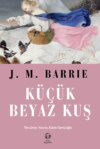Kitabı oku: «A Widow's Tale, and Other Stories», sayfa 31
CHAPTER II
Perhaps he was not so kind as he ought to have been to his mother. At sixteen how can it be expected that a boy could enter into a woman's feelings and put himself in her place? It seemed utterly wild to him – without reason, without sense, a defiance of all laws. What a thing to do! to fling off the people who belonged to you, whoever they were, because they had made a mistake about a railway train!
After her story was told, there was not very much conversation between the mother and son. He went and worked in the garden a little with great energy: which was John's chief work, for the garden formed a great part of their living, – what with the flowers, which were sent into the Nice market, and vegetables, which were the staple of their own food. And then suddenly he threw down his spade and went out, feeling that he could think it all over better if he were out of reach of any call upon him. He went up the valley, which was so green and sweet – the valley where farther up the violets are grown in furrows like corn, filling the air with sweetness, though they have no higher destination than the greasy boilers of Grasse. John clambered up one side of the hills to a favourite spot among the trees, whence he could see all the wide landscape stretching out before him – the soft sea, in all its shimmering tints of blue, and the long cape of Antibes stretching far out into the water. There were not many of his comrades who cared at all for the view; but it was inarticulately dear to John, who never said anything about it, but climbed to that mount of vision in all his perplexities, to take counsel of the boundless horizon and the long-stretching lines of the hills. But to-night it made his heart sick to look out upon that vast panorama of sea and sky, one more blue than the other, crossed by soft whitenesses of cloud and shadow, and looking like one quarter, at least, of the great globe. How often had he gazed out over it, and thought of his sailor father nearing home! Oh, the fine vision of that hope unfulfilled, that life so full of gentle wishes long subdued, of longing love and expectation, and almost certainty of happiness to come! And now he was told that it had never been. This it was which filled him with the very rage of grief and loss. Hot tears like fire filled his eyes. No father, no sailor coming out of the unknown, with light in his face to bless the memory of his child! – no father at all, except that horrible figure at the hotel, the swollen and bloated face, the dead glare under the eyelashes, the ignoble countenance. John was French enough to fling himself down on the hillside, amid the bushes of cistus, and dig his hands into the soil in a paroxysm of pain and misery, though he was also English enough to be ashamed of this frenzy, and to pick himself up and do his best to subdue it. Must he give it up for ever, that vision which had accompanied him during almost all his conscious life? She said it had never come from her – she had not deceived him; and perhaps it was true, though he was quite unconscious that he had never betrayed to her that fancy and longing of his heart; but, at least, she must have known what the neighbours said – the story that some one must have invented, but which every one held as the truth, and he most of all. John wondered whether if he had ever betrayed that ideal she would have let him know that it was an illusion, and that his real father was very different. He doubted very much if she would have done so, or if he would ever have known the truth at all, except for the catastrophe of to-day; and with this thought a chill doubt of his mother and of everything in earth and heaven came into the boy's heart. Who would ever tell him the truth if she did not? and was he sure that he knew everything now, and that it might not change again, like a dissolving view? The foundations of the world were shaken, and he was not sure that at any moment the earth might not yawn and a gulf open before his very feet.
The day was darkening when he came down again from the hill. Lights were twinkling all round the horizon: the steady light on the point of Antibes, the little revolving one on the pierhead of that little town, which he had always been so fond of watching as it went and came; and in the distance, towards the east, the light of the Cap Fêrat standing out into the sea; and the little glimmer of the household lamps of Cagnes mounting in steps upon the hillside; and below a little flame from the railway and the cafés that surrounded it. When he turned his eyes from the sea, it was the latter that attracted John with a sort of sinister fascination. It flared out vulgarly, coarsely, into the night, so unlike the charm of those beneficent, calm lights held up on every side to guide the travellers at sea; but it drew his feet unwillingly towards the place where that horrible event had occurred which had changed all John's life for him. His father – not the father who slept under that silent shining of the Mediterranean, a father who had never been, except in the boy's dreaming soul, but whom he could not part with, who was a portion of himself – but the other, the dreadful reality, lying in the bare white room yonder, uncovered, in the clothes which seemed to make that reality more horrible still – was he still lying there as before, like a wreck, like something cast up by a wave, lying straight out, the head lower than the feet, in that awful way? John shuddered; but he was drawn, he knew not how, to the place, and stood in the dark opposite for a moment, looking at the glaring light and the men who sat at the round tables in front of the café, talking loud and all together. They had discussed the event till it was exhausted, and all the new lights it threw on l'Anglaise, Madame Jeanne; but now they had returned to their natural topics, and were as noisy as ever, quite unmoved by any recollection of that lump of ended being which lay up-stairs. He stood and watched, with a strange throb of horror and rebellion against that thing to which it appeared he owed his life, and at the same time with a sense of grievance in the carelessness of the men who paid no respect to it. As he stood there, the half-closed shutters were softly opened in that room, and a shadowy figure came out upon the balcony. John knew by the white cap that it was a Sister.
"Pour l'amour de Dieu taisez-vous, mes amis," said a soft voice, audible in the interval of the clamour below.
There were faint lights in the room into which she went silently back. Charity was watching over him, then, – watching and praying. John went away home very quietly, overawed, and saying nothing even to himself.
He was too late for supper, which was arranged on the table, though untouched; but he had no mild reproach to encounter, as he would have had in an ordinary case. His mother was seated at a little table, with a piece of paper and a pencil in her hand, writing, and then pausing to count her words and strike out now one, now another. She was saying over those words to herself aloud as he came in, and only looked up at him, not saying anything to him, continuing her task.
"Beg you to come to guard my son's interests. Beg you come, for boy's sake. Beg come – " She went on, withdrawing or changing a word every time.
"What is it, mother?" said John. These were almost the first words he had addressed to her since he had heard her story.
"I am writing a telegram. It will cost a great deal to go to England; I am trying to put it in as few words as possible."
"May I see it, mother?"
How happy it is to have a subject, something to discuss which is not the one absorbing thing, at the time of a great crisis! The two came together once more over this paper which had to be written so carefully. There was very little money in the house. Indeed they did not live much on money, these two people, but on their garden, and by simple ways of barter, with the smallest possible dependence on any currency; and to have to pay so many francs at the post office for a telegram struck them with dismay. In this point Madame Jeanne, who had lived for one part of her life in a country and class given to telegrams, was more at her ease than John, to whom it seemed incredible that as much as five francs, or even more, could be given for a mere message – a thing that was nothing, and benefited nobody. He asked her a great many questions on the subject.
"Who is this?" he said; "and why do you want him to come here?"
"He is my guardian, John."
"Your guardian? But he does not seem to have taken much care of you, mother."
"He did, as far as he knew. He thought that to marry me to some one who – would take care of me – was the best."
"But then he did not choose well – or else – "
"I was to blame, John. I don't want to clear myself. I was young, and I thought only of the moment and not of what was to follow. I didn't even know," she said, dropping her head abashed before her boy, "that God was going to send me a – child to comfort me. Oh!" she cried, taking his hand suddenly, "I am not sorry! I am not sorry, though I am to blame. How do I know how you would have been brought up? And we have lived very happily; and you are a good boy, a good boy, my own John – "
He let her cry upon his shoulder, but he did not know what answer to make. He could not yet forgive her the loss of his father – the sailor who had never come home. But his voice was more gentle as he said, "Mother, if it is to be sent to-night, I must run to post with it now."
The telegram was made up at last. It was not written in telegramese, and it cost more money than it ought. The reader will see how many words might have been spared. It was addressed to C. Courthill, Esq., Grosvenor Square, London.
"You will have heard I am here and my husband dead. Have been living here all time. Beg you come take care of my boy.– Jane."
He ran with it all the way, counting the francs in his hand – eight francs, enough to have bought a great many things. He grudged the money very much, wondering why there should be so much haste, and if a letter would not have done as well, which would have cost twenty-five centimes and no more. But there are some things in which even a big boy must give in to his mother, especially when all the francs are hers. He returned more slowly, thinking this time more than he would have acknowledged of his supper.
And thus the day that had made such a change in his life, and indeed made far more changes than he had the least idea of, came at last to an end.
In the morning he said more cheerfully, "Don't be so discouraged, little mother. When the funeral is over and those people have come and gone, we shall forget everything, and things will go on just as before."
Madame Jeanne shook her head; but she was thankful for the softening in her boy's tone, and said no more.
He thought a great deal during the interval that elapsed before the arrival of the people who had been summoned from England and the formal funeral which followed immediately. It was not that there was any connection between this event, so far as he realised it, and the development of his own life. But a touch of fiery stimulation had been given to his mind, and his thoughts flew beyond this very unpleasant, but, so far as he was aware, inoperative catastrophe, to the real matter which was of importance, which was, what was going to be done with him? He was not so submissive as a French boy. Something of the English breeding his mother had given him, and the English books he had read, had given independence to his thoughts. He had made up his mind not to settle down, half-peasant, half-villager, to the lowly life of the country, to grow vegetables for his own nourishment and flowers for the market at Nice. He wanted to go away from Cagnes – to go to Paris, perhaps even to London, and study art. Since ever he had known himself, he had loved a pencil beyond any other toy. He had scribbled upon stones, upon palings, upon doors, upon every wall that came in his way, since ever he could remember. The consequence was, that he had got as far unaided as a kind of caricature – perhaps the first step, as it is the easiest. He made sketches of the country-folk, which were very amusing to their neighbours, getting a kind of flying likeness with a burlesque touch, with the end that everybody was delighted by all the portraits in his picture-gallery except their own. His ardent desire was to go to Paris to perfect himself in his art, to become a great painter, and to send home a great deal of money to his mother. Perhaps he did not think very much of the lonely life she would lead, of the change it would make to her; but he did think of acquiring a very handsome house, perhaps the chateau which was on the very top of the hill, and commanded all the views – on the one side the sea, with Antibes on its promontory, and on the other the mountains and the valley, the great Rocher of St Jeannet, which cleaves the lines of little hills asunder, and the snow of the Maritime Alps behind. What backgrounds he would get for his pictures in that beautiful country! He would come back from Paris and the studios as soon as he was rich enough, and live there in the lovely spring, and study and make sketches, and live the old life which made his mother happy. Yes, he would take up that life again, and she would be as happy as ever, if she had only the patience to wait. But after this great disturbance John did not feel as if he could settle. He had said that things should go on just as before; but when his mother shook her head John's mind too made a great and sudden start, and he saw that things could not be as they had been before. At sixteen one is almost a man: the other lads were beginning to think of the time when they must draw their numbers, when independence would begin; he, as an Englishman, would not be called upon to draw any number; but he could not live upon his mother any longer – he must get to his work and begin his life.
He had resolved to talk to her about this the day after the funeral, when everything, he thought, would be over, the Englishmen gone back again, and the ordinary conditions of existence resumed. It might be hard upon her after all the excitement; but John felt that he would be cruel only to be kind, and that it would be best to have it over. The looks of the Englishmen did not altogether please him. He was French enough to have a little hostile feeling to these two middle-aged, or rather old gentlemen (as he thought), with their looks of exaggerated gravity and trouble, who came into his mother's cottage as if they disapproved of it highly, as if it were something they had a right to interfere with. What right had they to interfere? They had, of course, to do with the funeral, at which John, in a very curious jumble of feeling, had to walk as chief mourner, not knowing whether he were more gratified by the importance of his position, or overawed by the melancholy, or anxious to have all the fuss over and everything settled back into the old lines. But he was angry when both the Englishmen accompanied him back, all being over, to his home. He did not want them there again. He wanted to be rid of them, now that their business was completed. And they talked to each other over his head, as it were, as they walked along, amusing themselves by discourse and discussions of what was to happen to a certain "he" with whom they seemed to have a great deal to do. "He must be made a ward in Chancery," one said, "and proper guardians appointed"; and "his education will have to be attended to," said the other, – "of course he can have had none hitherto." "What a chance for a lad like that!" John felt a little sorry for the boy, whoever he was, whom they discussed like this. Madame Jeanne rose to meet them as they came in, darkening the little house with their big, black shadow. Everything was in solemn order to receive them, and she herself dressed in black, looking as John had never seen her look before. She was very pale, but had a kind of dignity about her in her black dress. She bade them be seated as a princess might have done, and then she drew John close to her and took his hand in hers.
"I understand," she said, her voice rather faint but firm, "that you have come now to speak to me about my boy."
"There are a great many things to speak to you about, Janey," said Mr Courthill, the man to whom the telegram had been sent. "You could not expect that our departed friend should have shown you any consideration after the way in which you treated him."
"I expect nothing," said Madame Jeanne, hurriedly; "I am quite willing to allow that I deserve nothing from him."
"And he was not aware that you had a child."
"No; I did not," she said, drooping her head, "know myself – or else it might have made a difference."
"I am glad to hear you say that – I am very glad to hear you say that; all the same, when you did know, it was your duty to have communicated a fact which was of so much importance, and which would, as you must have known, have given him so much pleasure."
Madame Jeanne shivered a little, as John felt, but she made no reply.
"Is not this losing time?" said the other lawyer. "You will have opportunities afterwards of reading lessons to Mrs Rothbury, Courthill. She may have taken a foolish step – she certainly did – but we can't change that now. She might have had a better provision had she acted otherwise. Our part is to tell her what is the state of affairs now – "
"I am coming to that. I only want you to feel, Janey, that you have no right to expect any consideration – "
"I expect nothing," she said – "nothing!" dropping John's hand to clasp her own together. Then she turned to him again, and took it back in hers. "The only thing that vexes me," she said, sadly, "is that I have ruined the boy. I ought to have thought – Who was I, to keep the joy all to myself? I acknowledge humbly that his father ought to have known."
"I am glad," said Mr Courthill, "to see you in such a proper frame of mind."
"Mrs Rothbury," said the other, impatiently, "I don't see that my part is to moralise. I must tell you without any more circumlocution that your husband has died intestate. There is no will."
"There is no will?" She looked from one to another with the blank of ignorance. What this meant for her or for her child she was without the faintest suspicion. "Indeed," she repeated, earnestly, "I have no right to anything. I never expected anything. I only hoped perhaps that, being proved to have a son – "
"His next of kin," said the lawyer, "and only heir."
There was a great silence in the room – a poor little cottage room, white wooden chairs and table; nothing that could be called a carpet on the floor; roses waving in at the windows in the luxuriance of a Provençal spring, but no other ornament. The boy's acute ears took in the words without understanding them; the mother repeated them vaguely with a kind of consternation.
"His heir! what do you mean? what do you mean?" she said.
"Janey, though you deserved no consideration, no generosity – "
She turned from this moralising voice to the stranger on the other side. "What do you mean?" she said.
"You, of course, will take your lawful portion as the widow. We are aware, Mrs Rothbury, that you have not, perhaps, fulfilled the duties of a wife – but otherwise you have done your husband no wrong. There is nothing that can be objected to in your conduct – and your son is his father's natural and only heir. I have long wished him to make a will; but he never would – guided, we may believe, by a higher instinct. It was what he wished for before everything, a son who would be his heir."
Then Madame Jeanne, who had been so calm, hid her face in her hands. The tears burst forth in a flood. "I have no right, no right to anything of his. I have kept John from him," she cried. "How was I to know it was the desire of his life?"
John caught the strange news at last with a sudden glow of illumination. He stood in his clumsy peasant youthfulness, unable to say a word, or to give any evidence of his excitement, gazing at the speaker with wide-open eyes.
"And, my boy," the lawyer continued, "you must understand your responsibility, and give your mind to the training which will make you fit for it; for you will be a very rich man."
An inarticulate sound escaped from the boy's throat. Oh, the sailor who had never come home, who had left his son nothing but love and honour! It was the anguish of the pang with which at last and for ever that tender apparition floated away, which wrung that cry out of John's heart.
"But, mind you, you deserved nothing from him," said the voice of the other man, see-sawing with uplifted hand from his chair – the guardian who had delivered John's mother to her fate.
"And I would rather have nothing," she cried. "I do not deny it. I did not do my duty by him, – how can I take anything from him? And I can make my own living, as I have done so long – if you will only think of the boy."
"Mother!" said John, tremulous, with his eyes shining, "it appears we cannot take our own way again. We are not the only people in the world. I am worse off than you, because I have lost what I believed in – my father; and even my mother in a way. But now I've seen him," he added, with a shiver, "and I don't blame you. If you had only told me from the first!"
"He was an excellent man of business – a very successful man – a father you would have been proud of," Mr Courthill said.
Another shudder of emotion shook the boy for a moment. "Anyhow," he said, "that's the truth at last." He set himself very square on his feet and faced the two Englishmen with that curious sense of hostility to them, as if it were they who had injured him; and yet an attitude which was entirely British, though he was not aware of it. "And I'll stick to it. I am not one for running away," said John.
This is not the usual way of accepting a great fortune. There was no elation in his mind over an advance which was almost miraculous. The two men stood, not knowing what to make of the boy in his curious mixed nationality. To his own consciousness he had lost far more than he gained: but how were these strangers to understand that?
This was how John Rothbury, not without a sharp pang, found out his true name and his real position in life.











